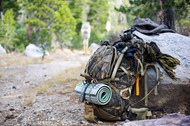Supplies for a Whitetail Hunting Backpack
May 11th 2023
Before the first whitetail hunt of the year, you’ll find us arranging and rearranging our packs. When you’re out on a hunt and there are no restaurants or super-stores nearby, you’re entirely dependent on what’s been packed into your sturdy day bag. New hunters may be tempted to fill their packs with pounds upon pounds of extras. While those things would be great to have, the extra weight of bringing too much can be just as much of a problem as not bringing enough.
A heavy bag might not be bad on a quick walk, but when you’re trudging through the woods, up a steep slope, or across a waterway, just a few unnecessary pounds will have you wishing you’d stayed home. Most hunters learn what to pack through trial and error. It takes time to know what you’ll be grabbing for and what’s dead weight. We’ll go through some of our necessities to help fill out that backpack whether you’re a seasoned or new hunter.
First Things First
While hunters differ in what they choose to bring on a hunt, there are a few non-negotiables. The first is most certainly water. You can survive a lot outdoors, but a lack of water will take you down faster than any predator. In fact, most of your backpack’s weight should be taken up by water. We prefer to attach a bladder or canteen to the outside of the bag with a carabiner to save space. If you need additional backups, consider collapsible water bottles that can be flattened when not in use. Food is the next must-have. Remember that you’ll be expending a lot more energy than an average day, so look for foods that are high in calories, protein, and nutrient-dense. Many hunters opt for nuts, jerky, and protein bars, but others prefer to carry a portable stove and a few freeze-dried meals.
Another necessity, though one that is too often skipped, is a small first aid kit. We aren’t talking about the enormous, paramedic-sized first aid kits, just something with the basics. Be sure you have some bandaids, antibacterial ointment, alcohol for disinfecting, hand sanitizer, and anti-itch cream. And don’t be afraid to add any items you find yourself needing on a regular basis at home.
Lastly, something you certainly don’t want to be without is a hunting license. Not only is it illegal to hunt without this piece of paper, but you’ll find yourself in serious trouble if you meet a game warden without one. It’s also a good idea to store your license in a waterproof bag; It won’t be of much use if the rain makes any printing illegible. Even consider leaving it in a special pocket so you can access it easily.
Basic Gear
Being outdoors for days on end isn’t something most of us are doing regularly, so we may not think of some of the basics to stay dry and comfortable. One of the most important things to consider for both safety and comfort is staying dry. A wet hunter is an unhappy hunter. We can’t recommend this enough: pack rain gear. Having a waterproof jacket, hat, gloves, pants, and boots could be the difference between enjoying a long hunt and heading home early. Proper rain gear can even help avoid hypothermia if the weather takes a turn. In that same vein, never be without a survival blanket. This compact piece of gear will be your best friend on that rushed, late-night camp setup after you’ve been tracking whitetail all day.
Heavy-duty clothing and blankets are a high priority, but they aren’t the only things that will ensure your hunt is successful. No hunting kit is complete without a durable, sharp hunting knife. You’ll want to find one that is crafted specifically for the outdoors, and make sure to keep it sharpened between hunts. Another important piece of kit is a reliable flashlight. Whether you plan to track dear into the night or need to check out some rustling bushes after dark, you’ll never regret having a flashlight. Find something long-lasting and test it before heading out. And whether you’re confident in your fire-starting skills or not, never leave home without a lighter or tools for starting one. Lighters are a relatively small addition to your pack that could save your life. In the event you can’t construct a bow drill, they’ll help you start a quick fire, and if you need to burn the end of some rope to create a solid knot, you won’t have to start a campfire to do so.
For the Hunt
You might be wondering when you can start adding actual hunting gear to your pack. That time is now. First, invest in a rangefinder. This device will let you know how far away the whitetail is and help you to make a decision whether your rifle will make the shot. Next, you’ll want some heavy-duty game bags. Many hunters bring trash bags, and these can work, but may rip when filled with heavy meat. Losing that precious deer might be the worst way to end a hunt, so a game bag is a much safer bet. We also recommend a headlamp. Even if you’ve packed a flashlight, being able to work into late hours with a hands-free headlamp will be a welcome benefit. And before closing up that pack and tying it up securely, add a game call to the top. Placing it on top will allow you to access it without having to shuffle around when a buck is within range.
While these are our tried and true recommendations, you may find that yours differ after a season or two of hunting experience. No matter what you shove into your overflowing pack, be sure to pack, unpack, and practice walking with it. Don’t let the first time your backpack hits your shoulder be when you’re stepping into the woods. Walk around the house; maybe take a walk through the neighborhood or local trails. Let the bag get comfortable. As with all aspects of hunting, smart preparation will help you be successful. Pack your backpack well, practice carrying it, and get ready for an adventure. A good pack means a good hunt.


